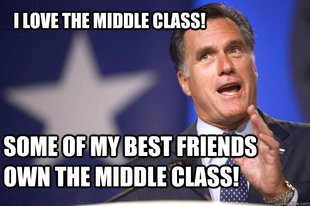Let's take a step back and talk a bit more about the meme: what is it and why are they important? In the simplest sense, a meme is a single unit of a cultural idea. A term originally coined by Richard Dawkins in his book "The Selfish Gene." Dawkin's intention was to describe how ideas move. Memes are supposed to be flexible, reproduce and continue to move through a culture. In this election, like every other, a new set of memes has emerged. I described some in that post I mentioned above. Another kind of meme that has taken the stage in this election is the Internet joke standard image with text pasted over. Take a look at the image above. The world of social media is covered in images just like this.
Nathan Jurgenson says that in this election, the meme has become a meme. The Internet joke picture has become a talking point for how each candidate is stacking up, in the big picture. As the popularity and importance of social media emerges in this election, so too does the new language of political discourse. In a 140 character world, the biggest punch in the smallest of spaces reigns supreme. This is how we talk politics today.
So, how does it work? Do these images change the course of politics? The answer is, they kind of don't work. For better or worse, these images don't seem to change anyone's mind about which candidate to champion. "The internet jokes are aimed at committed voters," according to Poynter. It's voters talking to voters, and not necessarily as scripted as the campaigns would like them to be. The campaigns themselves cannot control the message or the content. As a matter of fact, that "out of control" part of the message may actually be part of the appeal. As committed voters, the people who share these jokes already know the script.
The Romney and Obama campaigns may have spent hundreds of millions of dollars on TV and Web ads, but spontaneous memes created by average people are stealing their thunder and arguably doing a better job of "messaging," says Vincent Harris, a Republican political consultant who ran the digital campaigns of Texas Gov. Rick Perry and Newt Gingrich at various times during the GOP primary.
If it is about committed voters talking to other committed voters, and no one's mind is substantively changed, why bother? Jurgenson says that memes serve a completely different purpose. Memes, like the one above, give people a bigger chance to participate in the political process. It's a way of voting again and again, using your Facebook wall, Tumblr or Twitter feed.
This memeified election thus marks a clash between exemplars of the top-down and the bottom-up: a Presidential race filled with official campaign releases and big-media discourse vs. social media. Presidential politics have long seemed too distant, a contest in which any individual voter has little say — especially if one doesn’t live in a swing state. That democracy-defining act of user-generated content — voting — is rigidly delimited and bureaucratic, but above all, it feels inconsequential. In contrast, social-media sites like Facebook and Twitter have deeply infiltrated our culture exactly because they provide voice.
Smart. Scary, but smart.
Pass it on.





No comments:
Post a Comment